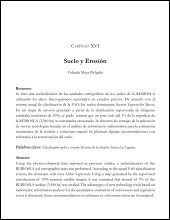Bacterias promotoras de crecimiento de plantas autóctonas y su efecto en Prosopis chilensis (Molina) Stunz
Native plant growth promoting bacteria and their effect on Prosopis chilensis (Molina) Stunz
Author
JORGE ARNOLDO VILLEGAS ESPINOZA
EDGAR OMAR RUEDA PUENTE
BERNARDO MURILLO AMADOR
MARIA ESTHER PUENTE
FRANCISCO HIGINIO RUIZ ESPINOZA
SERGIO ZAMORA SALGADO
FELIX ALFREDO BELTRAN MORALES
Metadata
Show full item recordAbstract
"En la actualidad se está deforestando en México la especie de Prosopis spp. para utilizarse como leña y carbón, en diferentes zonas áridas de nuestro país. Para su producción se utiliza fertilizante sintético, con ello hay un incremento de salinidad del suelo, subsuelo y mantos acuíferos. La presente investigación se realizó en Santa Ana, Sonora, México en 2006. Se aislaron y purificaron microorganismos asociados al sistema radicular de Prosopis glandulosa que se desarrolla en cráteres de la zona volcánica de la reserva de la biosfera El Pinacate y Gran Desierto de Altar Sonora. Las bacterias promotoras de crecimiento de plantas presentan la peculiaridad de fijar el nitrógeno atmosférico; se midió el efecto de las cepas aisladas en germinación y en el desarrollo en plántulas de P. chilensis. Fueron aisladas 19 colonias; de ellas, solamente una colonia bacteriana mostró alta actividad de reducción de acetileno y capacidad de solubilizar fosfatos, se identificó como Bacillus amyloliquefaciens. Nuestros resultados sugieren que B. amyloliquefaciens, presenta una afinidad particular para crecer de 0 a 0.75 M de NaCl y desarrollarse en temperaturas de 30 a 50 °C. Los efectos de la inoculación de B. amyloliquefaciens, conjuntamente con A. halopraeferens, mostraron reultados favorables en el incremento de la germinación y el desarrollo de plántulas de P. chilensis. Éste es el primer reporte de B. amyloliquefaciens como bacteria promora de crecimiento de plantas asociada a P. glandulosa." "Today in Mexico are being deforestated the species Prosopis spp. for use as firewood and charcoal, in various arid regions of the country. For its production a synthetic fertilizer is used, thus there is an increase in soil, groundwater and aquifers salinity. This research was conducted in Santa Ana, Sonora, Mexico in 2006. Were isolated and purified microorganisms associated with the root system of Prosopis glandulosa growing in craters of the volcanic area from El Pinacate and Gran Desierto de Altar, Sonora Biosphere Reserve. The plant growth-promoting bacteria present the peculiarity of fixing atmospheric nitrogen; the effect of the isolates on germination and seedling development in P. chilensis was measured. 19 colonies were isolated; of them, only one bacterial colony showed high acetylene reduction activity and ability to solubilize phosphate, was identified as Bacillus amyloliquefaciens. Our results suggest that B. amyloliquefaciens, has a particular affinity to grow from 0 to 0.75M of NaCl and develops at temperatures of 30 to 50 °C. The effects of inoculation of B. amyloliquefaciens, along with A. halopraeferens, showed favorable results in the increase of germination and seedling development of P. chilensis. This is the first report of B. amyloliquefaciens as a plant growth promoting bacteria associated with P. glandulosa."
Collections
Related items
Showing items related by title, author, creator and subject.
-
PROMOCIÓN DEL PERIFITON PARA EL CULTIVO DE CAMARÓN BLANCO: HACIA UNA ACUICULTURA ECOLÓGICA
DOMENICO VOLTOLINA LOBINA; JUAN MANUEL AUDELO NARANJO; MARIA DEL ROSARIO PACHECO MARGES -
Suelo y Erosión
YOLANDA LOURDES MAYA DELGADO


